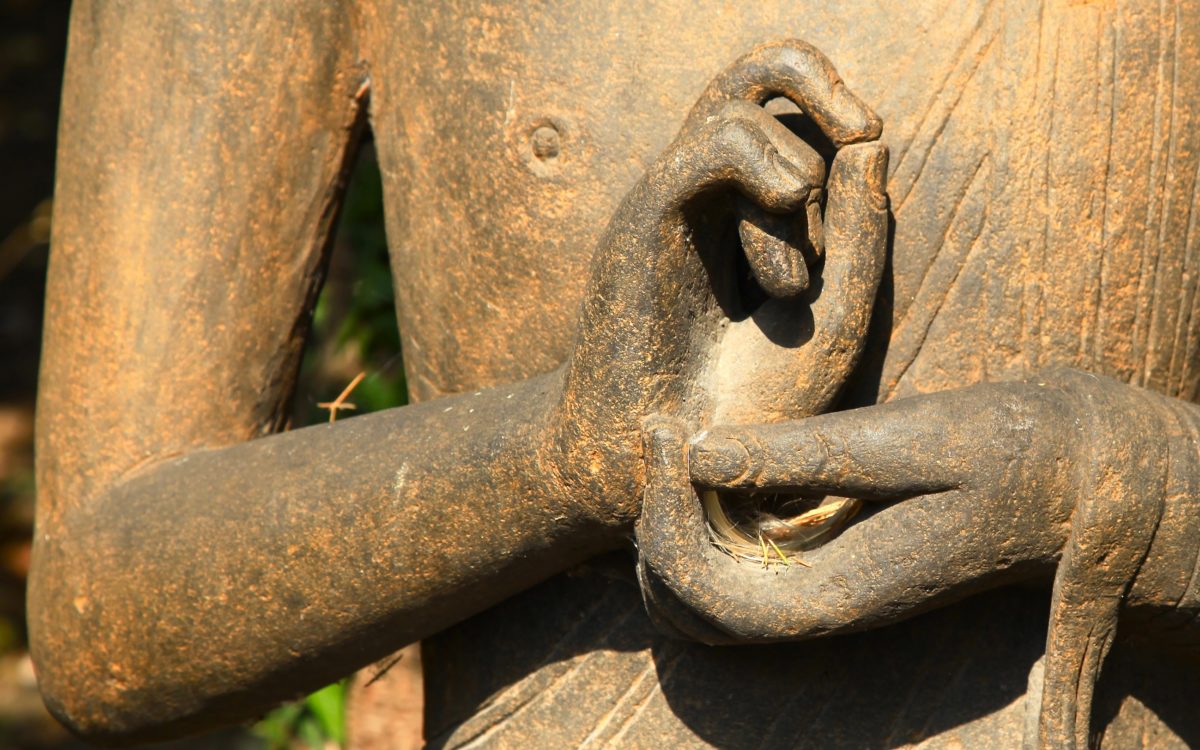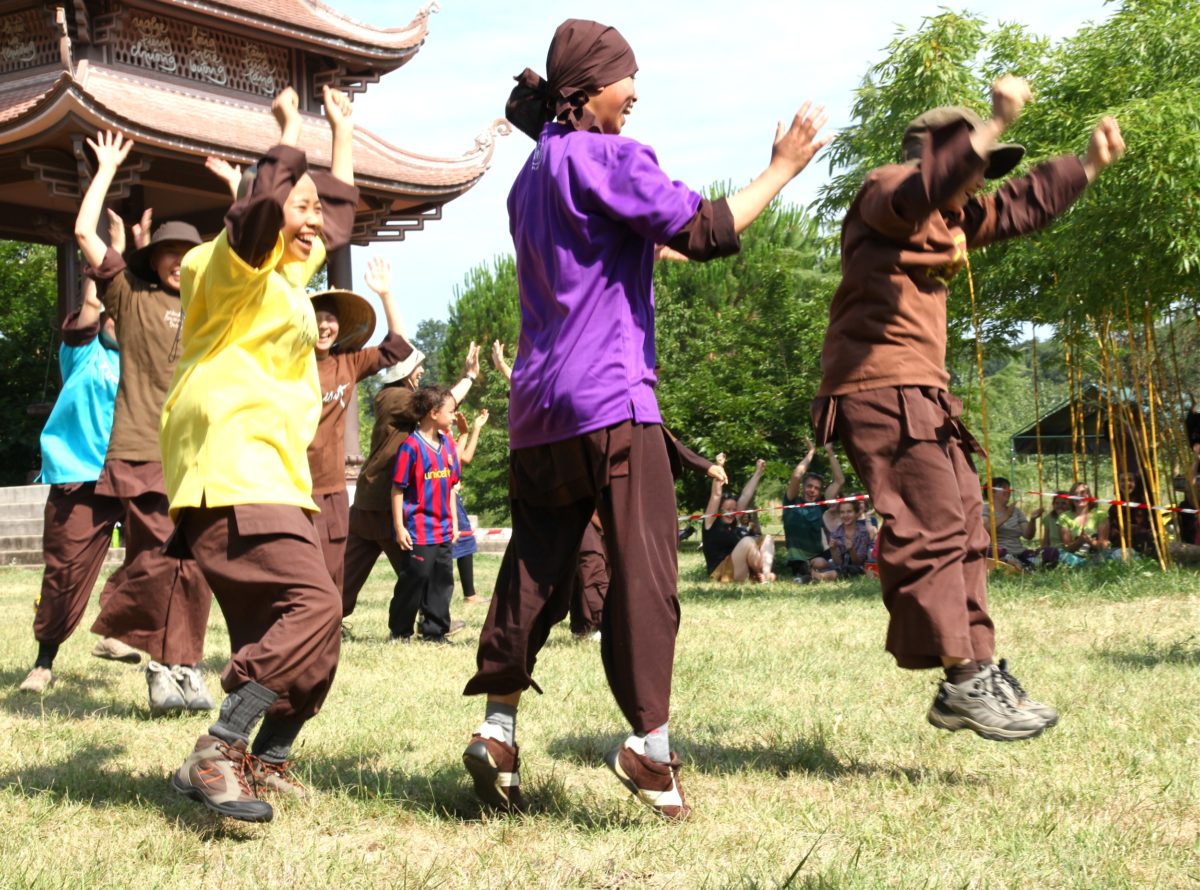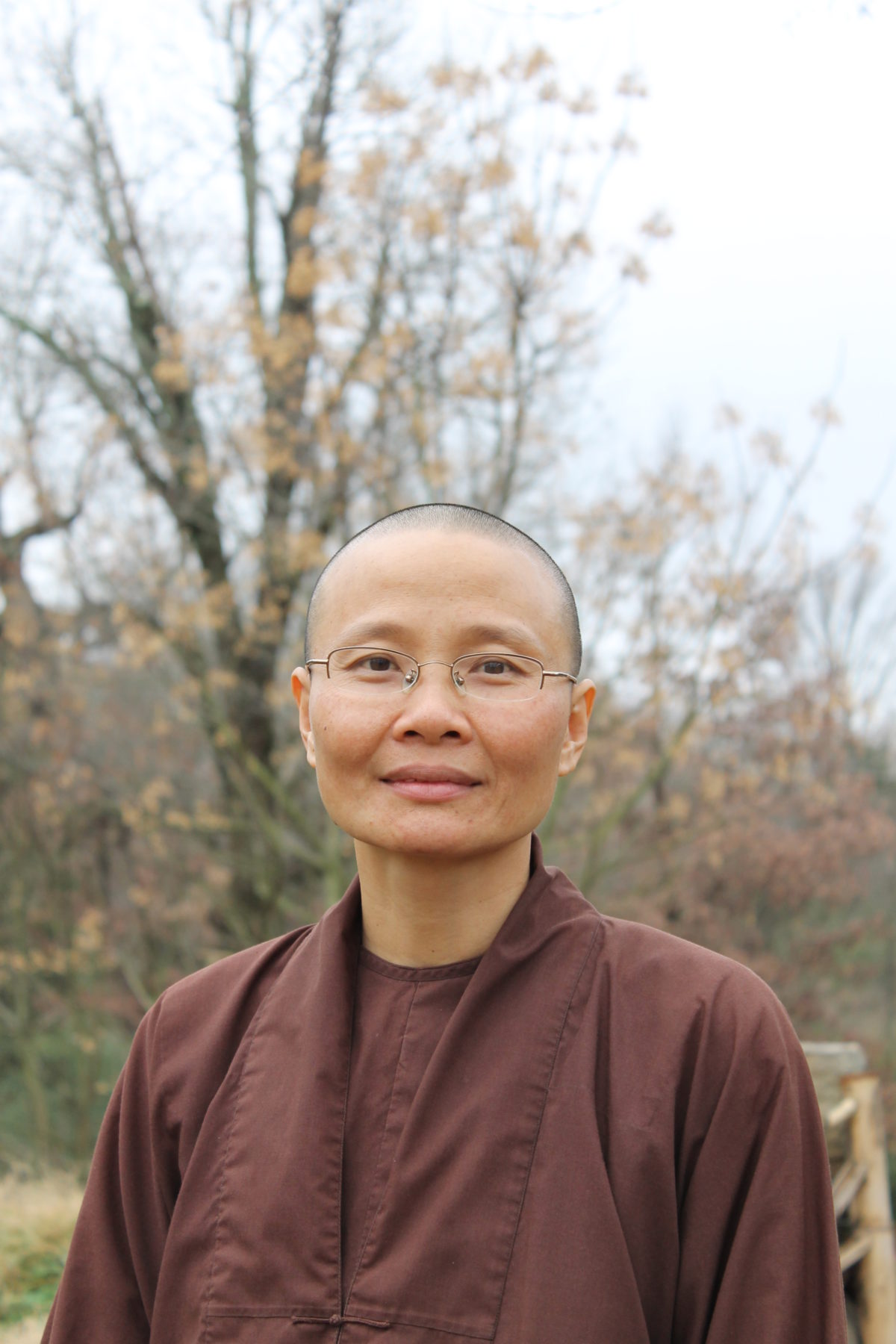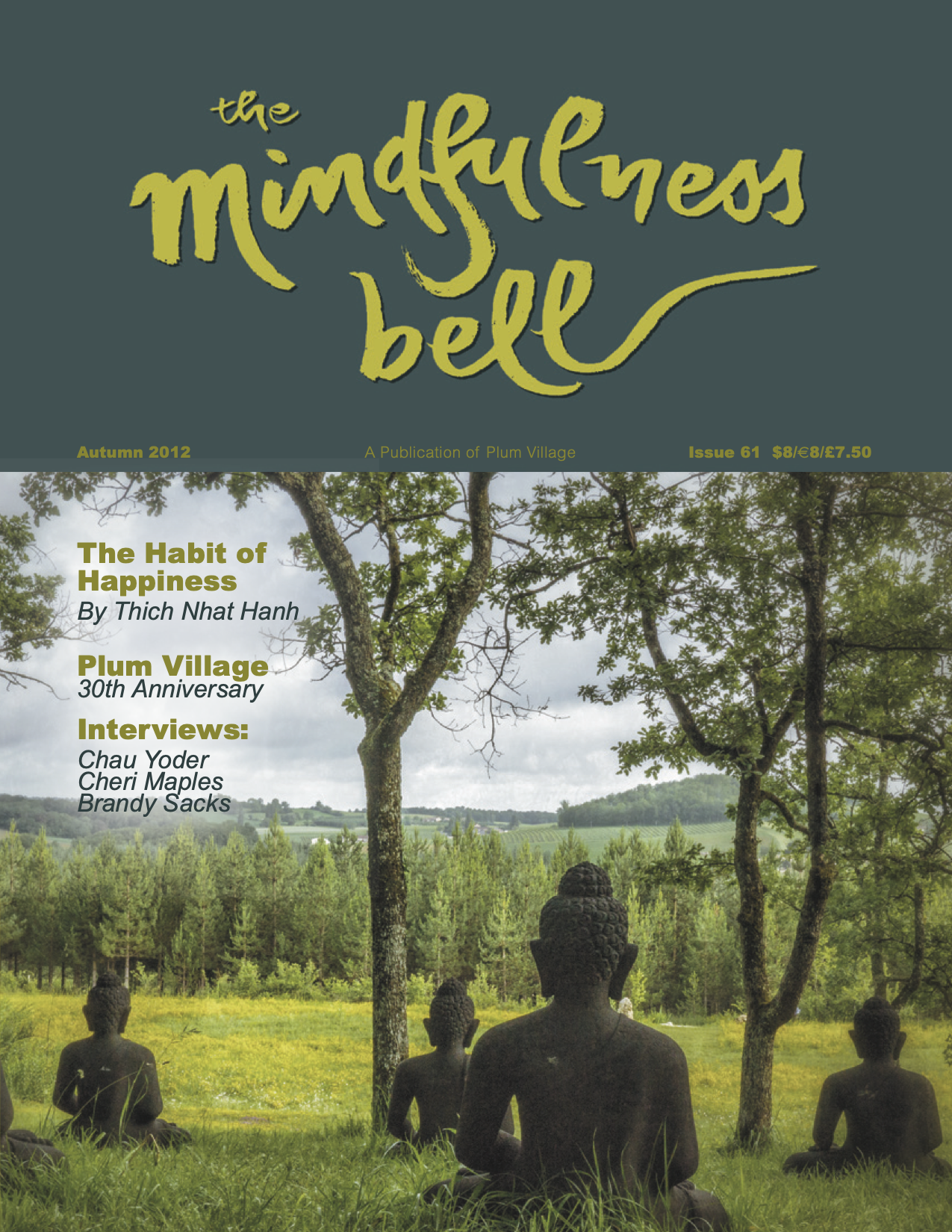By Sister Hy Nghiem

Dear Thay, dear Brothers, dear Sisters, and dear Sangha,
Today is February 19, 2012, and we are in our final week of the winter retreat here at Magnolia Grove Monastery. Today we continue our investigation of the Fifth and Sixth Mindfulness Trainings of the Order of Interbeing.
THE FIFTH MINDFULNESS TRAINING: COMPASSIONATE, HEALTHY LIVING
Aware that true happiness is rooted in peace,
By Sister Hy Nghiem

Dear Thay, dear Brothers, dear Sisters, and dear Sangha,
Today is February 19, 2012, and we are in our final week of the winter retreat here at Magnolia Grove Monastery. Today we continue our investigation of the Fifth and Sixth Mindfulness Trainings of the Order of Interbeing.
THE FIFTH MINDFULNESS TRAINING: COMPASSIONATE, HEALTHY LIVING
Aware that true happiness is rooted in peace, solidity, freedom, and compassion, we are determined not to accumulate wealth while millions are hungry and dying, nor to take as the aim of our life fame, power, wealth, or sensual pleasure, which can bring much suffering and despair. We will practice looking deeply into how we nourish our body and mind with edible foods, sense impressions, volition, and consciousness. We are committed not to gamble or to use alcohol, drugs, or any other products which bring toxins into our own and the collective body and consciousness, such as certain websites, electronic games, music, TV programs, films, magazines, books, and conversations. We will consume in a way that preserves compassion, well-being, and joy in our body and consciousness and in the collective body and consciousness of our families, our society, and the earth.
This mindfulness training wants us to know that true happiness is not something that we can find outside of us. If we want to have true happiness, then we need to know how to create the conditions for happiness to manifest. The Buddha taught that we must know how to take care of our body and our mind. He showed us how to do that through the practice of mindful breathing.
We depend on our breathing to live. If we breathe in and we cannot breathe out, then our life ends. Sometimes when we are busy in our daily lives, we don’t have the capacity to get in touch with our breathing. That is why in the Sutra on the Full Awareness of Breathing, the Buddha taught us a very simple and concrete practice: “Breathing in, I know I am breathing in. Breathing out, I know I am breathing out.” Awareness of breathing helps us to cultivate and establish wisdom, and that wisdom gives us the capacity to recognize what really brings us happiness. Do money, fame, or praise bring us happiness?
Recently, the famous singer Whitney Houston died. She had a special voice and she could sing many styles of music. She was very famous and very wealthy. But let us ask ourselves, did these conditions bring her happiness? Even though she used her money to help organizations that alleviate hunger in Africa, she was not able to find peace and happiness. The loneliness in her was too immense. She used drugs to cover that loneliness and one day she overdosed and died.
We may have looked at her talent, wealth, and fame, and wanted to be like her. But the truth is that all those things didn’t alleviate her loneliness and sadness; they were not able to give her true happiness and peace. If we want true happiness, then we must live with mindfulness. And if we want to be mindful, we must use many methods to help ourselves, to develop peace in our body and in our mind. The Sutra on the Full Awareness of Breathing teaches us to become aware of our in-breath and our out-breath, and in this way, to calm our whole body and mind. Our mind’s tendency is to think about the past and the future instead of staying in the present moment. We only need to be dwelling in the present moment and we find happiness here. We see that happiness is very simple.
Offering Dharma to Ourselves
In 1999 there was a flood in Vietnam and many people died. When I first entered the monastery I really wanted to do charity work, so I helped with the Love and Understanding program. In this program, we send letters to our friends who have participated in our retreats, inviting them to give us a helping hand to alleviate the suffering in Vietnam. I worked with so much love and inspiration. And in one day I received hundreds of letters from friends. When we receive a donation, we send out a thank you letter. But one day I received so many letters, and I began to feel, “How come no one is helping me?” And suddenly I began to blame others, and sadness and anger arose.
So I lost my peace for a few minutes. Fortunately, I did not let that energy carry me for long. A few minutes were enough to destroy me. I could see that I was making myself suffer because of blaming. As practitioners, we bring our compassion to many places, but if we lose our peace, then the work we do only becomes an outer form. No real helping can happen.
And that is the lesson I learned. From then on, each time I worked I became more aware of bringing my practice into the work that I did. When we want to offer compassion to other people, the first thing we must do is to learn to love ourselves. We come back to our breathing to calm down the negative thoughts, the negative mental formations. That is why the Buddha taught us to use mindful breathing to calm our body.
This precept also says that we do not take as the aim of our life fame, profit, wealth, or sensual pleasure. Our practice is to know how to live satisfied with what fulfills simple needs. In the Sutra on the Eight Realizations of the Great Beings, the third realization says that the human mind is always searching outside itself and never feels fulfilled. This searching brings about unwholesome activity. Bodhisattvas, on the other hand, know the value of having few desires. They regard the realization of perfect understanding to be their only career. For example, sometimes we need electronic devices to keep in touch with the news, but we should not waste too much time with them. We should not think that in order to have happiness we need them. We should not run after them.
So first we must offer the Dharma to ourselves, transform our suffering, transform our pain, transform what has become stuck in our heart. When we are able to practice like this, then the spirit of this precept will give us happiness in the present moment and we won’t need to seek material goods, wealth, or fame.

THE SIXTH MINDFULNESS TRAINING: TAKING CARE OF ANGER
Aware that anger blocks communication and creates suffering, we are committed to taking care of the energy of anger when it arises, and to recognizing and transforming the seeds of anger that lie deep in our consciousness. When anger manifests, we are determined not to do or say anything, but to practice mindful breathing or mindful walking to acknowledge, embrace, and look deeply into our anger. We know that the roots of anger are not outside of ourselves but can be found in our wrong perceptions and lack of understanding of the suffering in ourselves and others. By contemplating impermanence, we will be able to look with the eyes of compassion at ourselves and at those we think are the cause of our anger, and to recognize the preciousness of our relationships. We will practice Right Diligence in order to nourish our capacity of understanding, love, joy, and inclusive- ness, gradually transforming our anger, violence, and fear, and helping others do the same.
When our anger arises, we must use our eyes of compassion to look at the situation. For example, when a person does or says something that makes us suffer, if we can look with compassion at that situation, then we are able to understand the reasons why this person acted that way. And if we know how to practice, to nourish that peace inside of us, then this becomes a source of energy that can help us to deal with our strong emotions. If we do not practice, then suffering will always be there. The Buddha taught us in the Four Noble Truths that there is suffering, and that we have a path to overcome that suffering. This is the Noble Eightfold Path. This is the path of practice.
There is a story about a couple who didn’t know how to speak lovingly or nourish each other’s happiness, so, day by day a distance grew between them. They lost their ability to communicate, and irritation, loneliness, and fear manifested. The husband began to go out and get drunk, then came home and hit his wife and reprimanded her for being the cause of his misery.
The wife suffered so much she decided to go to the temple. She told the abbot her family situation. The wise abbot told her, “Let me give you the nectar of compassion and if you use it right you will suffer less. Each time your husband comes home and yells at you, you must drink it but don’t swallow; just let it stay in your mouth. If you swallow it, the sacredness will not be there to protect you.”
When her husband came home, she took a sip of the nectar of compassion and kept it in her mouth. No matter what her husband said, she could not say anything in return. For many days he came home and yelled at her, and when she didn’t respond, he fell asleep. And then one day the husband thought to himself: Why is my wife being so kind? Before, whenever I came home and said something to her, she would say something back. And if I threw a small bowl, then she would throw a pot. He told her, “My darling, recently you seem kinder, you are not angry like before. And thanks to your kindness, today I am able to transform.”
The wife told her husband about the nectar of compassion given to her by the abbot. So the husband went to the temple and told the abbot the nectar of compassion given to his wife was wonderful. The abbot responded, “It is not the nectar of compassion; it’s just water! When you are both angry, you can create a fire that will burn the whole house. But when you hold the water in your mouth, you cannot say anything, and your anger dies.”
This method helped the family to reestablish harmony, but they still didn’t know how to transform their anger. To do this we must know how to look deeply to find the roots of suffering. When we see someone act in anger, we bring our mind of compassion to look deeply into it. Then we do not blame or punish the person, but we want to find the best ways to help them transform their suffering and find happiness. This is the practice called Right View that leads to Right Thinking and Right Speech, through which communication can be established.
Refuge in the Practice
If our anger is triggered, we must take refuge in the practice; we must come back to our breathing so that we can control our body and our mind. Then we can bring the energy of love so that we can understand the situation. To do that we must know how to stop. We stop our bodily movements and our speech, and then we stop what is not so beautiful in our mind. And then we are able to see the roots of the suffering in this person: their family history and the long process that has created this person. And we are able to let go of that anger.
This precept tells us that each time we have anger we should not do or say anything. We take refuge in our breathing; we practice walking meditation. When we are calm, we are able to reconcile what is in ourselves and we learn to look at other people with eyes of compassion.
Once there was a young gentleman who got angry very easily. And each time he got angry, he would hit things. His mother could not stand it. One day he went into the forest, where he found a cave. Into the cave, he yelled, “I hate you.” The echo from the cave came back to him, saying, “I hate you.” When he heard this, he was so disappointed and so sad. He went back home and asked his mom, “Why does everybody hate me?” When his mother asked what had happened, he told her about the message from the cave, and that it meant that in the whole world, nobody loved him. The mother told him to go back to the cave, and this time to say, “I love you.” When he did this, of course the cave answered back with love. When your mind has love, your eyes shine, and when you shine with love, the world responds with love.
These two precepts show us how to live the simple and healthy life of a practitioner. When we know how to take care of our body and our mind, our understanding and love grow. When we are able to make one step in peace, when we sit with our minds peaceful, the person next to us can feel that energy. As practitioners we must know how to love ourselves, to establish peace in our body and our mind. Then we have the capacity to share our practice with the world. We can be the hands of the bodhisattvas.
TRANSLATED BY SISTER BOI NGHIEM. EDITED BY BARBARA CASEY.

Sister Hy Nghiem(Sister True Joy) is from the U.S. and ordained as a nun in 1996. Sister Joy enjoys coming back to herself to be present for her body and mind. Reading sutras from the Buddha is also a source of nourishment for her daily practice.

